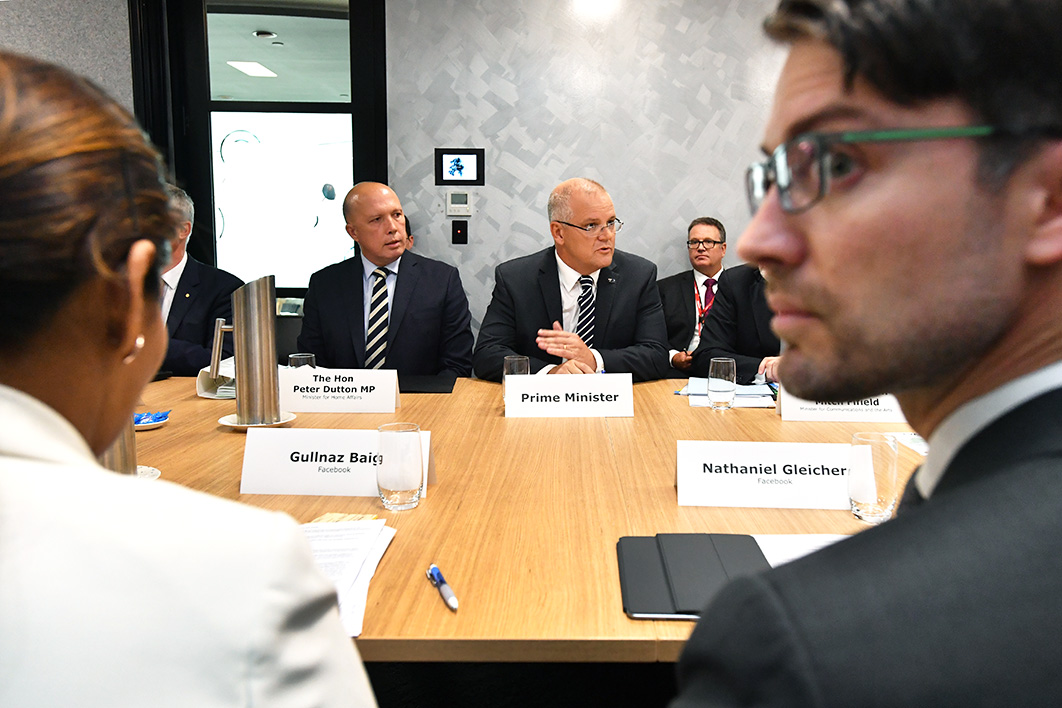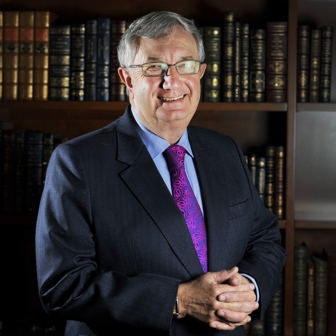The world’s largest and most powerful technology companies are getting used to pushback from governments and regulators around the world. Yet the evisceration they received when home affairs minister Peter Dutton took to the stage at the National Press Club in October last year may have taken them by surprise.
In a speech crafted to hit the US-based giants where it hurt, a pugnacious Dutton asked why the companies were opposing his government’s request for access to decrypted messages carried by services such as Signal and Facebook’s WhatsApp, given they had few qualms about doing business with the world’s most repressive regimes.
These companies were operating “in less democratic countries and accepting… a compromise on privacy to allow their presence in these growth markets,” he said, without naming his targets — although Google’s work on a censored search engine in China can’t have been far from his mind. They are “the same companies that need to be hounded to pay tax in Australia and other jurisdictions,” he added, “and the same companies who have misused personal data to commercial advantage.”
As knife twisting goes, Dutton was in top form. The “misuse of personal data” line was a reference to the Cambridge Analytica scandal, in which Facebook revealed it had allowed a British political consultancy to harvest the data of millions of users — including more than 300,000 Australians — without their consent. As for tax dodging, he was obviously alluding to Apple, Facebook and Google sidestepping European Union tax regimes by moving their profits to Luxembourg, Ireland, Malta and other zero- or low-tax jurisdictions.
Why the sudden antagonism? What had the tech companies done to deserve this broadside from one of the government’s most powerful members?
All we can be sure of is that the tech companies had been fighting hard behind the scenes to scuttle the encryption legislation, correctly arguing that the laws would have created “back doors” into encrypted messaging systems. To grant Australian law enforcement agencies this access, the companies’ lobbyists said, would build weaknesses into secure communications that could be exploited by criminals and hackers the world over. It would undermine legitimate and important uses of encryption — for example, in the transmission of medical records.
But the policeman-turned-minister wasn’t buying it — a point he made both in speeches and in submissions to the parliamentary committee reviewing the legislation. What was the difference between police or intelligence agencies intercepting a phone call and a message sent on WhatsApp? The only difference between the two, as far as he could tell, was that Silicon Valley said they were different. And if big tech had a problem with back doors — well, too bad.
“If a criminal had a handwritten plan detailing a paedophile network he had established, the police could obtain a warrant to enter the house and seize the handwritten note as evidence,” Dutton said. “If the same criminal typed the same detail of the plan and sent it via a text message or email, the police could again obtain a warrant and recover the text as evidence.”
But if the “exact same detail of the paedophile network was sent via an encrypted messaging service, like Wickr or WhatsApp, the police would not be able to recover the information,” he went on. “It is of course an absurdity because the clear advice from law enforcement and security agencies is that we are now losing our edge to criminal enterprises.”
What the US tech companies may have failed to grasp, and with them their local lobby firms — which include Nexus APAC, TG Endeavour, Hawker Britton and Barton Deakin, according to the transparency register — is that they were up against a core value of modern Australian conservatism. Ever since the 2001 Tampa affair, Australian centre-right governments have staked their claim to policies that centre on notions of state sovereignty; it’s a world in which laws apply, unaltered and undiminished, in every inch of Australian territory.
Critics, of course, would dispute the premise that a democratic country’s sovereignty is absolute. Every international defence treaty, every trade agreement or reciprocal immigration deal we sign brings with it a lessening of sovereignty. Yet the tech companies’ argument that their operations are supranational, that their technologies and content can’t be tailored to the requirements of national regulation, was never going to fly. Dutton wasn’t merely bringing vocal companies to heel over Australian law enforcement agencies’ right to crack encrypted messages; he was sending the message that no global company operating anywhere from Christmas Island to Tasmania’s South East Cape was beyond the reach of Australian laws.
In his showdown with Silicon Valley, Dutton didn’t blink. In spite of legitimate concerns about the lack of independent oversight of the encryption laws and their impact on local tech start-ups, by the end of 2018 the new rules had been rammed through in an eleventh-hour parliamentary sitting. The government has promised to review the legislation, but big tech and civil liberties advocates concerned with the law’s privacy implications suffered a loss from which they appear unlikely to recover.
But Dutton’s feud with US technology giants had only just begun. When an Australian gunman entered two mosques in Christchurch in March, allegedly shooting dead fifty-one people, he broadcast his actions live on Facebook. For whatever reason, the platform dragged its feet in removing the content, and graphic images were beamed into countries around the globe, including Australia. This event would unleash one of the most forceful regulatory backlashes a US digital company has yet to witness, anywhere in the world.
Within weeks of the killings, the Australian parliament had adopted laws that included prison sentences for local employees of digital platforms that failed to remove “abhorrent violent material” in an “expeditious” way. Local employees of Facebook and Google could wind up spending three years behind bars if they failed to move fast, no matter where the offending content had come from.
These laws marked the nadir of the relationship between Canberra and big tech. The prospect of company employees ending up in the slammer over something uploaded by a kid in Uzbekistan was shocking — particularly in the light of the legislation’s fuzzy reference to the “expeditious” removal of “abhorrent” content. But even more concerning for the platforms was the underlying logic of the legislation, which was contemptuous of the tech giants’ argument that they simply don’t have the power to tailor global content to suit national regulatory requirements.
The message from Canberra was that it wanted to regulate the global platforms as though they were Australian television broadcasters. “Mainstream media that broadcast such material would be putting their licence at risk and there is no reason why social media platforms should be treated differently,” attorney-general Christian Porter said at the time.
It’s this recasting of their role that the platforms object to. The shift is evident in the apparent success of Australian newspapers’ campaign to have policymakers view digital platforms as publishers of content — a definition at odds with the platforms’ argument that they are merely neutral conduits linking readers to media content. And with the abhorrent violent material laws, the Australian government is telling the world that the regulatory imbalance between platforms and television broadcasters is coming to an end. If Facebook or, say, Twitter’s Periscope want to be in the business of pumping out video content, then they should expect to be regulated as though they were a fully fledged local TV company.
Politically, this tough stance comes at zero risk. News Corp has been an outspoken critic of the platforms in its submissions to the Australian Competition and Consumer Commission’s digital platforms inquiry — an inquiry that has produced a damning account of regulatory failures in dealing with Facebook and Google. MPs on both the left and the right of the political firmament appear to agree that tougher regulation is needed, and the platforms’ argument that their content is supranational — that it can’t be edited country-by-country — is being dismissed if not ridiculed. If Facebook has the technology to target advertising at individual users, critics believe it can be expected to muster whatever software is needed to avoid shoving images of fifty-one people being shot to death into the faces of Australian users.
If any of this mucks up Silicon Valley’s global business model or puts at risk the security of communications outside Australia — well, it’s not Canberra’s problem. Big tech may believe in a borderless world, but Australian policymakers don’t. The message from the government is that capital-S sovereignty is here to stay, no matter what technology is thrown at it. •




